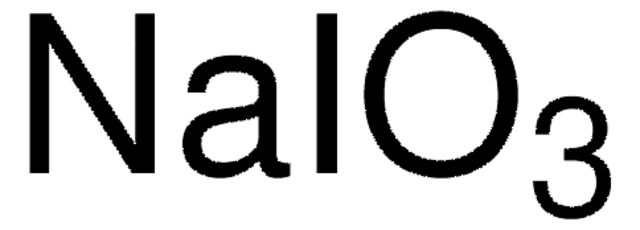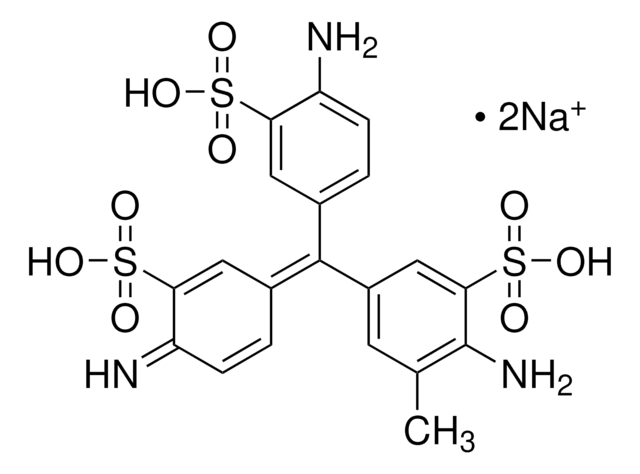About This Item
Recommended Products
grade
puriss. p.a.
Assay
≥99.5% (RT)
form
powder or crystals
impurities
≤0.005% total nitrogen (N)
pH
5.0-8.0 (25 °C, 50 mg/mL in H2O)
solubility
water: soluble(lit.)
density
4.28 g/mL at 25 °C (lit.)
anion traces
bromide, bromate, chloride, chlorate (as Cl-): ≤200 mg/kg
iodide (I-): ≤20 mg/kg
sulfate (SO42-): ≤50 mg/kg
cation traces
Ca: ≤100 mg/kg
Cd: ≤5 mg/kg
Co: ≤5 mg/kg
Cr: ≤5 mg/kg
Cu: ≤5 mg/kg
Fe: ≤10 mg/kg
K: ≤50 mg/kg
Mg: ≤5 mg/kg
Mn: ≤5 mg/kg
Ni: ≤5 mg/kg
Pb: ≤5 mg/kg
Zn: ≤5 mg/kg
SMILES string
[Na+].[O-]I(=O)=O
InChI
1S/HIO3.Na/c2-1(3)4;/h(H,2,3,4);/q;+1/p-1
InChI key
WTCBONOLBHEDIL-UHFFFAOYSA-M
Looking for similar products? Visit Product Comparison Guide
General description
Application
Signal Word
Danger
Hazard Statements
Precautionary Statements
Hazard Classifications
Acute Tox. 4 Oral - Ox. Sol. 2 - Skin Sens. 1
Storage Class Code
5.1B - Oxidizing hazardous materials
WGK
WGK 1
Flash Point(F)
Not applicable
Flash Point(C)
Not applicable
Regulatory Listings
Regulatory Listings are mainly provided for chemical products. Only limited information can be provided here for non-chemical products. No entry means none of the components are listed. It is the user’s obligation to ensure the safe and legal use of the product.
FSL
Group 1: Oxidizing solids
Iodates
Hazardous rank I
1st oxidizing solid
ISHL Indicated Name
Substances Subject to be Indicated Names
ISHL Notified Names
Substances Subject to be Notified Names
JAN Code
71702-BULK:
71702-VAR:
71702-25G:4548173989990
71702-100G:
Choose from one of the most recent versions:
Certificates of Analysis (COA)
Don't see the Right Version?
If you require a particular version, you can look up a specific certificate by the Lot or Batch number.
Already Own This Product?
Find documentation for the products that you have recently purchased in the Document Library.
Our team of scientists has experience in all areas of research including Life Science, Material Science, Chemical Synthesis, Chromatography, Analytical and many others.
Contact Technical Service









